Considering how reliant we are on technology these days, coding skills are more in demand than they’ve ever been. Whether you plan to go full-time or be a freelancer, there are an abundance of opportunities out there for you.
That being said, you may wonder if these options are open to you if you don’t have a college degree. The good news is that there are many successful coders who didn’t go to college. If you can prove you have the skills employers or clients are looking for, you’re likely to go far in this industry. So, are you ready to learn how to make money coding? Take a look at these strategies.
How Much Money Can You Make Coding?
There’s no specific amount of money you can make coding — it depends on your specific situation. If you’re going to become a full-time web developer for a company, for example, you can simply look at average salary information to get a good idea of how much you could make. According to Indeed, web developers in the US make $81,951 per year on average. But if you plan to be a freelancer, your income is both unguaranteed and unlimited.
Proven Ways to Make Money With Code (No Degree Required)
1. Create Mobile Apps
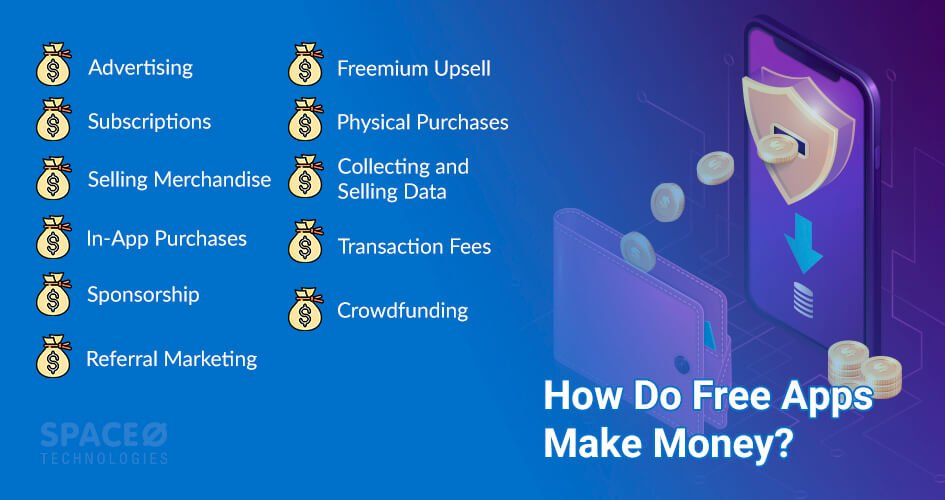
One of the first ways people learn how to make money coding is by making and selling mobile apps. You can choose to create apps on your own or as a service for someone else. If you create apps for yourself and put them on app stores, you’ll be able to keep the profits you make from it. There are a number of ways you can monetize your apps, including:
- Charging money for the app itself
- Creating a subscription service inside the app that gives users access to premium features
- Putting pop-up ads in the app
- Allowing users to get free in-app perks if they watch an ad
As mentioned, you can also create apps for other people. This is a great option if you’re short on ideas or you don’t want to maintain the app after you create it. You can offer your services on marketplaces like Fiverr.
2. Build Your Own Blog/Website
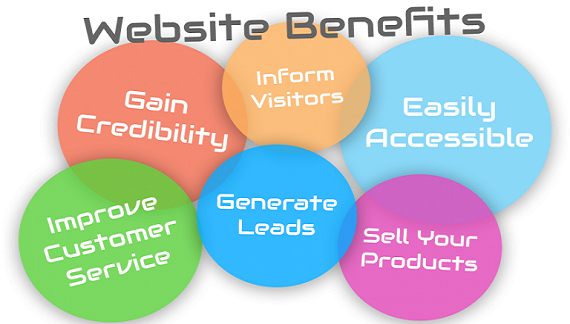
Coding skills give you the tools you need to build your own blog or website. Rather than being confined to the limitations of website builders, you’re free to customize your site as you’d like and add your own features.
Blogs are great for monetization since there are multiple ways for making money with them, such as ads and affiliate marketing. More broadly speaking, websites won’t always earn you money directly unless you’re selling something or you have ads on the site, but they are great for building a personal brand, looking professional for prospective employers, and hosting your portfolio.
3. Create Plugins for Various Platforms
Plug-ins add features to something without changing the program itself. These include browser extensions, WordPress plug-ins, and more. To get started creating a plug-in, you’ll need to think of a good idea for one. A good plug-in is one that gives useful features while running efficiently. Your plug-in idea doesn’t need to be 100% unique. Just as a few examples, there are multiple plug-ins that offer SEO insights and block ads. But yours should improve upon existing plug-ins in some major way to stand out.
If you’re wondering how to monetize your plug-in, this will depend on what you’re creating. Continuing off the examples I mentioned earlier, you can create paid WordPress plug-ins and get paid directly, or you can create a subscription service to access premium features in your browser extension.
4. Create Templates and Themes to Sell
Website themes and templates are always in high demand from website owners who are looking for a clean, modern website that reflects their brand. The most popular paid themes are for WordPress sites considering how widely used it is. According to W3Techs, WordPress is the content management system of 43.1% of all websites on the internet.
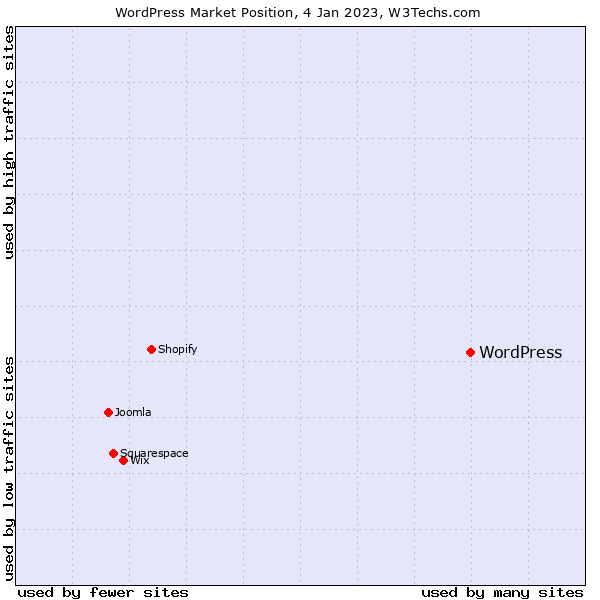
While there are many free WordPress themes out there, many choose to use paid WordPress themes for the unique benefits they come with. For example, premium WordPress themes tend to be updated more regularly, leading to greater security.
If you’re wondering how you should price your WordPress theme after creating it, the pricing varies from theme to theme. Many themes are sold on Envato Market, and here is a pie chart of the average prices on the platform:
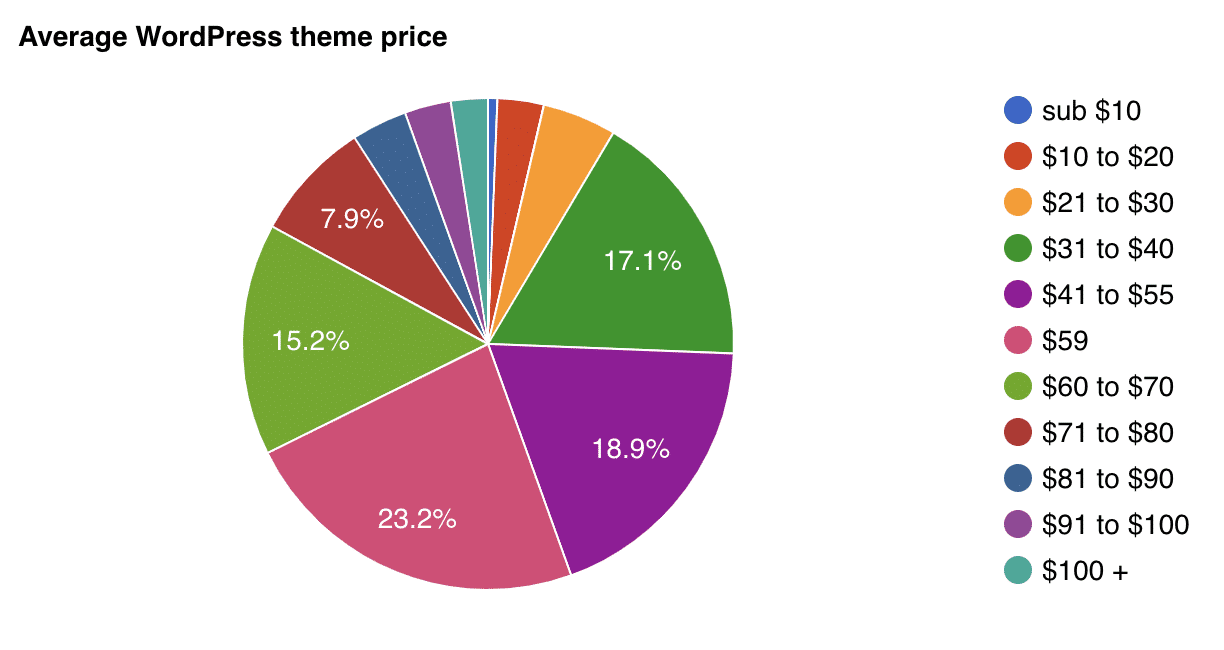
The prices can vary widely, but the most popular price is $59 specifically. If you want your theme to stand out among all the $59 entries, it’s best to price it a bit higher or a bit lower than this. Keep in mind that when you’re pricing your theme, cheaper prices aren’t always better. WordPress users are looking for the best blend of reliability, aesthetics, customizability, support, security, and features, and they’re usually willing to pay more to ensure this.
You don’t necessarily need to put your WordPress theme on a marketplace, though. You can also offer a custom theme on your own site, which gives you the freedom to price it however you want. Some WordPress themes are offered as part of an annual subscription. Elegant Themes is a good example of this pricing model since they offer access to four themes as well as updates and support. They also have a higher one-time price which grants users lifetime access to the bundle.
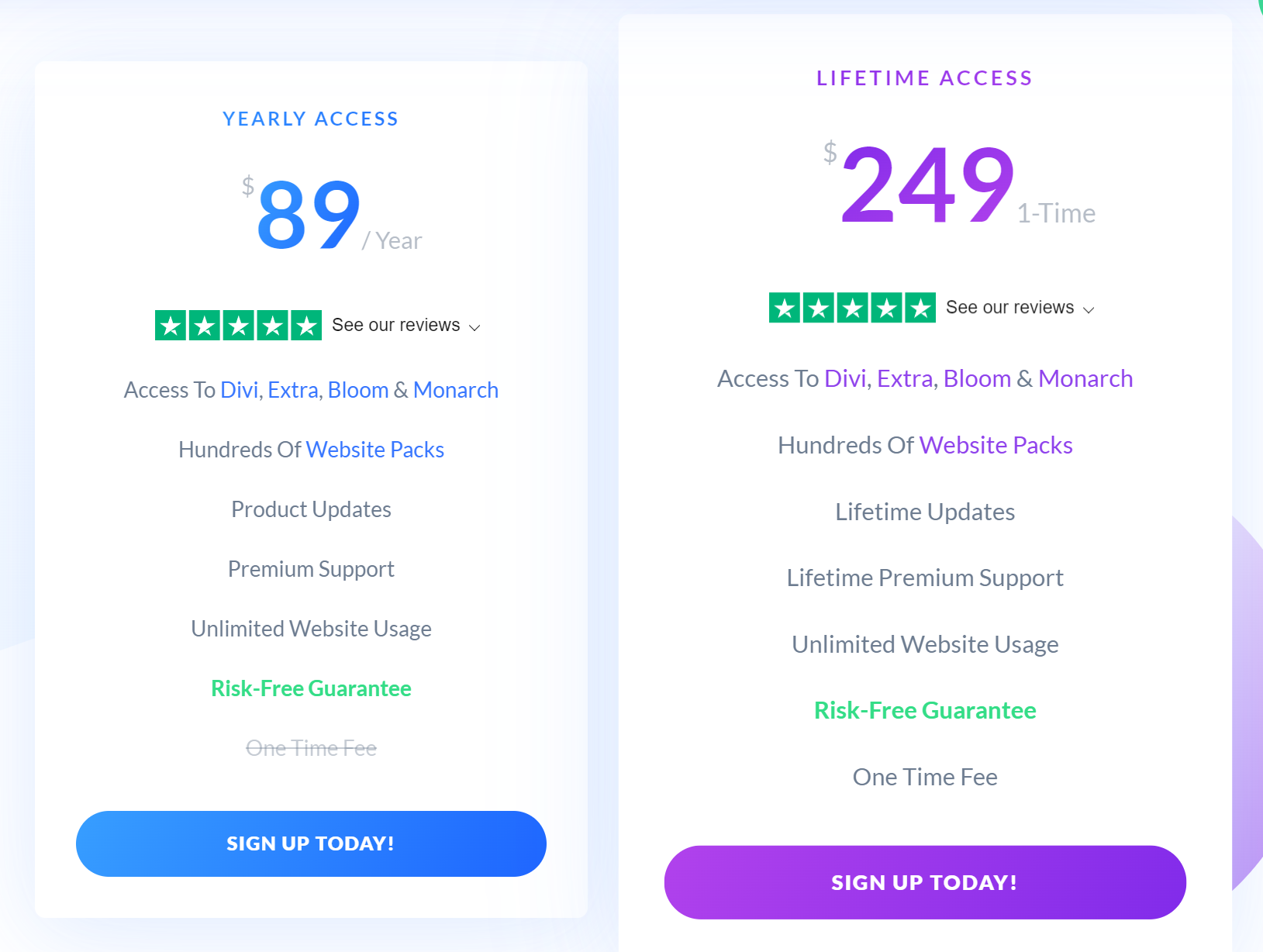
When you’re just starting out, you probably won’t be able to offer multiple themes as a bundle and all these other features, but it is something to keep in mind for the future.
Another tip for creating WordPress themes is to tailor your theme for a specific audience. There are many established WordPress themes that cater to pretty much everyone — as a new theme creator, competing with them is pretty much impossible. But not everyone has website themes custom-tailored for a specific audiences needs. To do this, you’ll need to do some market research for your desired target audience to find out what features they’re looking for in a WordPress theme.
5. Work as a Data Analyst/Data Scientist
Data science involves using code to get useful information from data. As a result, coding skills are a necessity. Working as a data scientist can be a very rewarding job since it can get you a consistent source of income, and most data science jobs pay very well.
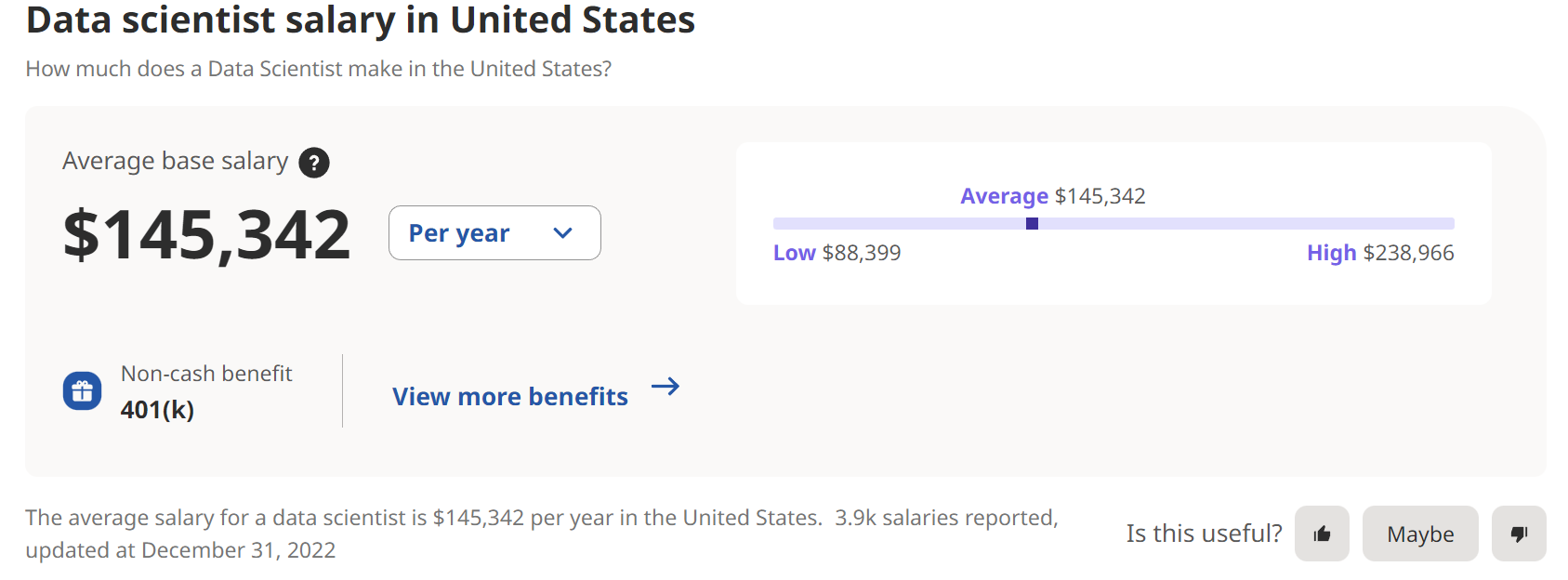
According to Indeed salary data, the average base salary for data scientists in the US is $145,342 per year. On the low end of the spectrum is $88,399 per year and on the high end, some data scientists make $238,966 per year.
Before you look into becoming a data scientist, there are some things you should learn first. Data science uses artificial intelligence and machine learning to get insights from data, so they are important to learn. If you haven’t already, it’s also a good idea to be proficient in Python. Python is one of the most widely used programming languages for data science. Many data scientists get the information they need through a bachelor’s degree, typically in computer science. But it is possible to get a data science job without a degree if you have the experience and knowledge to justify getting hired. It’s a good idea to build up a portfolio and take on internships to gain this knowledge. You can also consider getting certifications to bolster your resume.
6. Work on Small Software and Scripts
You don’t necessarily need to commit to complex app development or making a video game with a 40 hour campaign to put your coding talents to good use. Instead, you can work on small software and scripts. There are two main ways to do this: as freelance work or independently. If you choose to become a freelancer, you can try to find clients who are looking for small software and scripts. It’s usually best to start on freelancing platforms like Fiverr to get your first few clients. Just make sure to specify that you’re only doing simple coding work so potential clients know what to expect ahead of time.
You can also work on small software independently and sell them to people. I recommend combining this idea with your own website so you have a professional place to list them.
7. Become a “Bug Bounty Hunter”
A Bug Bounty Hunter is a coder who finds bugs in the code or in the live software. These are extremely beneficial for companies. One bug can cause major quality issues that worsen the experience of end-users. Or worse: they can create security vulnerabilities that lead to data breaches down the line, threatening the company’s reputation and the personal information of people who use the platform. Given this, it’s safe to say that Bug Bounty Hunters are highly valued by companies.
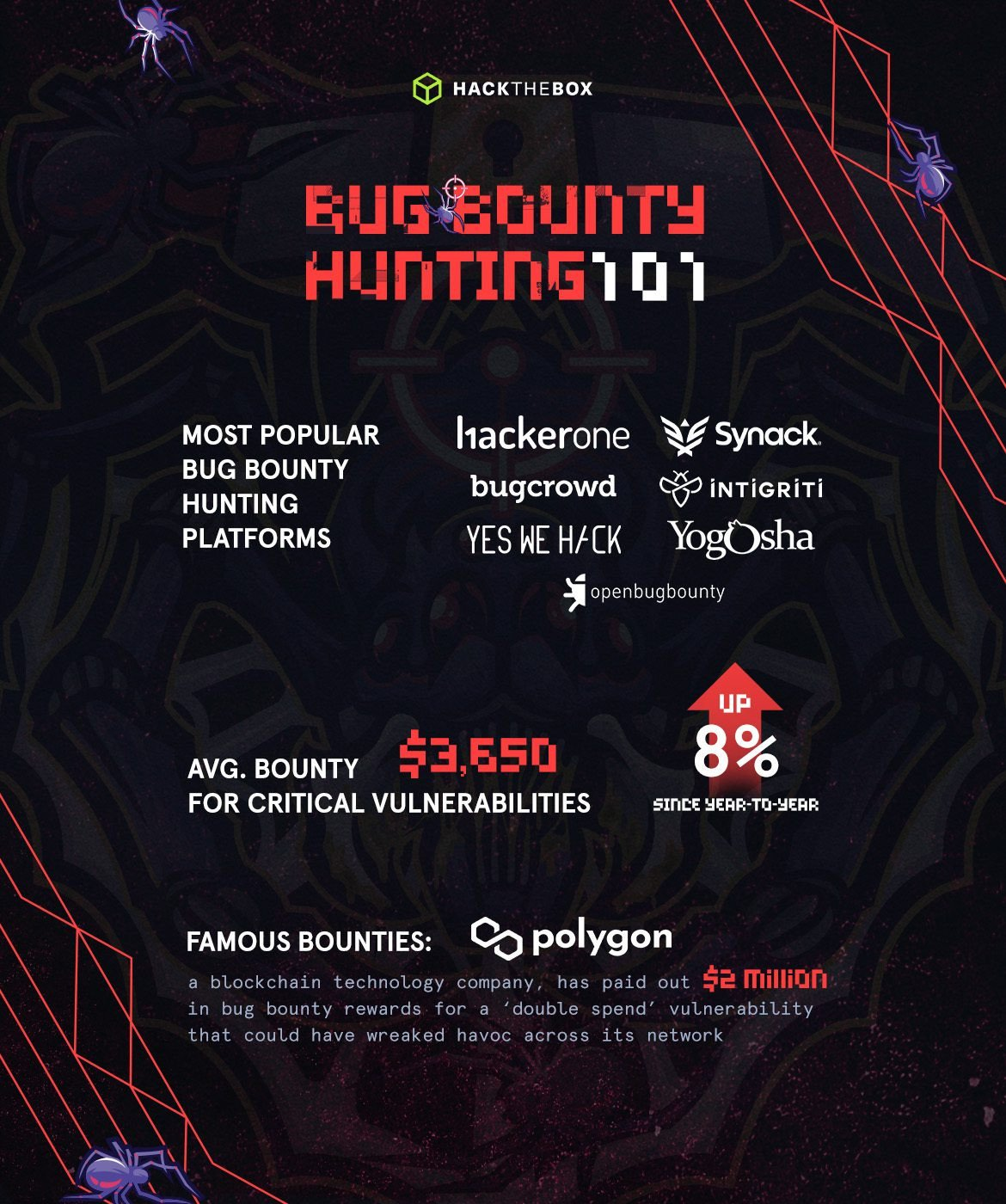
In the image above, you can see some of the best Bug Bounty Hunting platforms to get started on. Note that you aren’t limited to any specific platform — one of the great things about Bug Bounty Hunting is that it’s a completely independent job. You get to choose where you find bugs and the methods you use. If you can’t find any bugs on one site, you can always abandon the job and move on to a different one.
8. Contribute Work to Tech Blogs
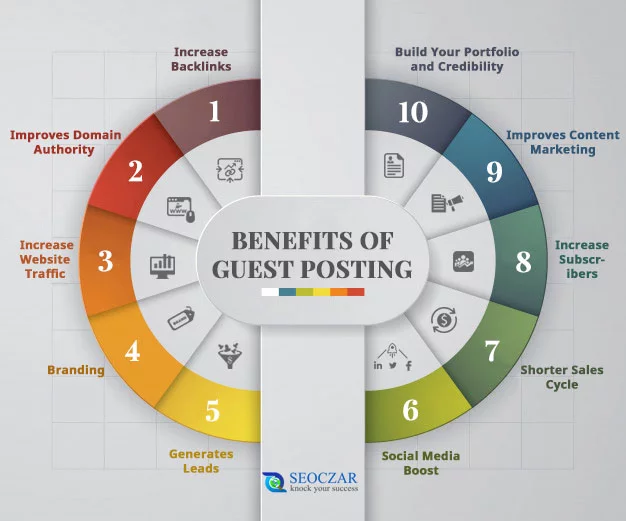
Besides creating your own blog, you can also contribute work to other tech blogs. Depending on the blog you contribute to, you may or may not earn money for your efforts. But you will be credited as a guest blogger, allowing you to call attention to your other efforts like a blog, YouTube channel, etc.
9. Create Paid Udemy Coding Courses
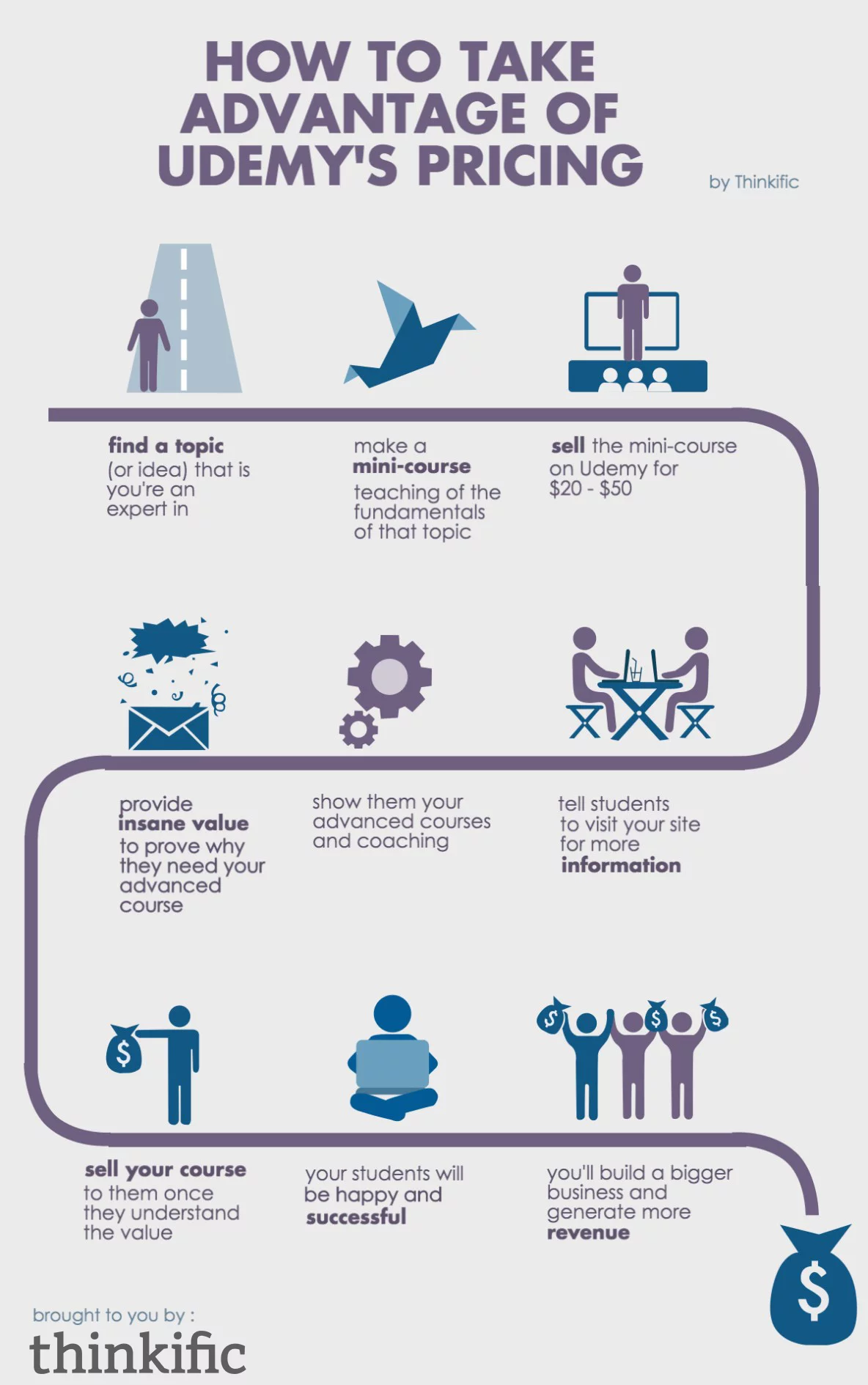
Udemy is a popular platform for online learning. On it, you can sell courses for those who are learning to code. Since there are many coding courses on the platform right now, it’s usually best to sell courses in a specific niche. For example, the course Coding for Writers: Basic Programming appeals specifically to coders who love to write to help them get better at coding and writing about code.
10. Write an eBook on Coding
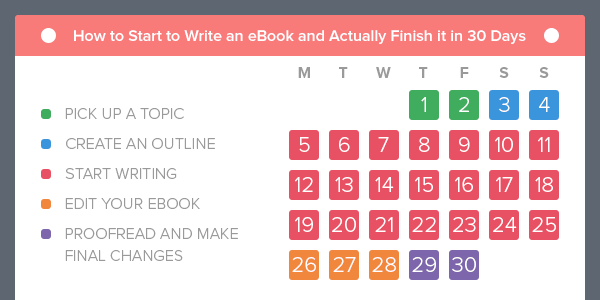
eBooks require quite a lot of initial effort, but once you’re done, they’re a great way to earn passive income. You’ll still earn money on the book so long as it’s still up for sale.
To publish a book on coding, you can go one of two routes: self-publishing or through a publishing company. Both of them have their pros and cons. Self-publishing allows you to have more creative control over the book and retain more of the profits. Meanwhile, going through a publishing company frees up the burden of having to edit the book yourself (or find an editor), design the cover, and so on.
For self-publishing, you’ll need to find a self-publishing company such as Kindle Direct Publishing or one of the other options in the image below:
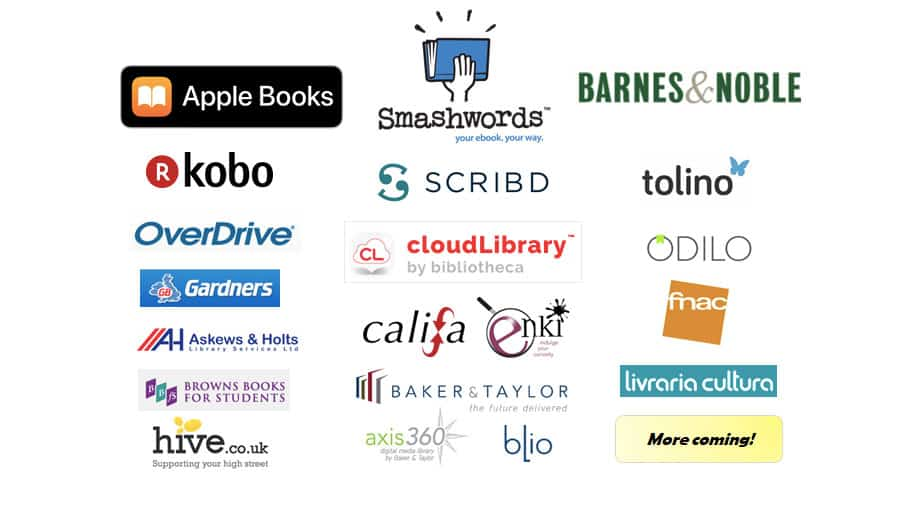
For traditional publishing, you’ll need to find a publishing company that a) publishes eBooks and b) publishes books on technology-related topics (coding included).
11. Start a Coding YouTube Channel
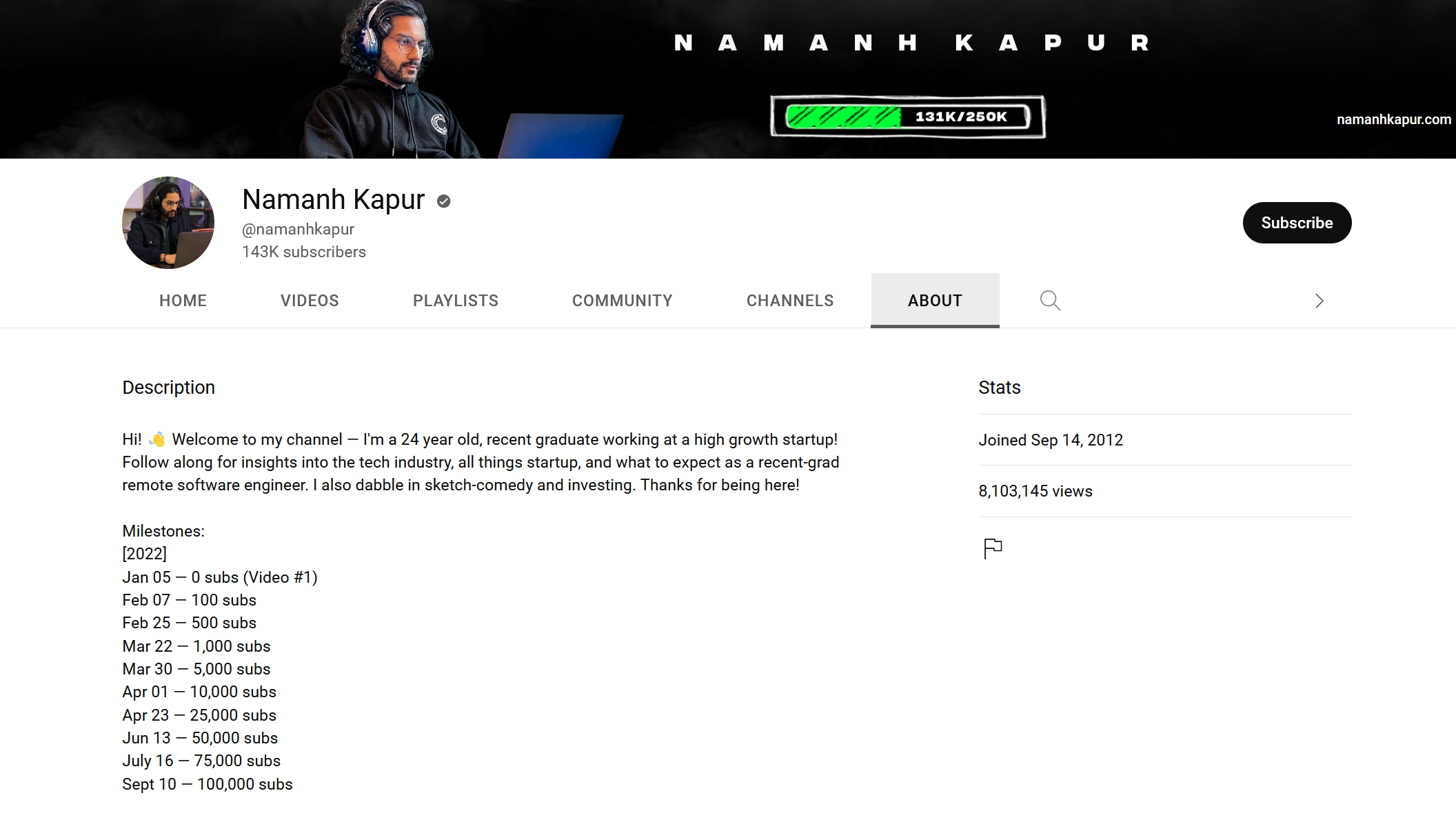
You can use your coding knowledge to start a YouTube channel. Coding content on YouTube is wildly popular, especially among those who are learning to code. Here are a couple examples of videos and channels that have done well on the platform:
- Learn Python – Full Course for Beginners [Tutorial]by freeCodeCamp.org received 38 million views. The channel currently has 6.97 million subscribers.
- How I Would Learn To Code (If I Could Start Over) by Namanh Kapur received 4 million views. The channel currently has 143K subscribers, 100,000 of which subscribed between January 5th (when he put out his first video) and September 10th, 2022.
While sharing your knowledge with the world is a benefit in and of itself, there are also specific benefits to being on YouTube particularly. One of the main benefits is that there are a lot of monetization methods available. These include (but aren’t limited to):
- YouTube Partner Program: This is where you earn ad revenue from your videos. In order to start, you’ll have to meet the minimum eligibility requirements. Once you do, it can be a great source of passive income since you’ll continue to earn money from your videos so long as they don’t get demonetized.
- Company sponsorships: Working directly with companies is often one of the highest sources of income for YouTubers. Before you can take on sponsorships, you’ll need a sizeable following (usually 100,000+ subscribers) and consistent engagement on your videos. Companies want to know that sponsoring you will help them get more potential clients.
- Affiliate marketing: Many companies these days have affiliate marketing programs. If you work with them, they will give you a special link you can put in the description of your videos. When your viewers click this link and buy something, you’ll earn a commission on it. Just make sure to leave an affiliate disclosure in the description letting them know about the compensation you may receive from the links. This is necessary to comply with the law. Affiliate marketing is not necessarily a high earner, especially when you’re just starting out. But the income you get from it is completely passive and adds up over time.
Besides monetization, another benefit of YouTube is that it’s great for building a personal brand. Putting out high-quality videos showing your coding skills will allow you to gain recognition as an authority in your industry. You’ll also get opportunities to collaborate with other coding YouTubers, which is great for networking.
Below are some more benefits of starting a YouTube channel:
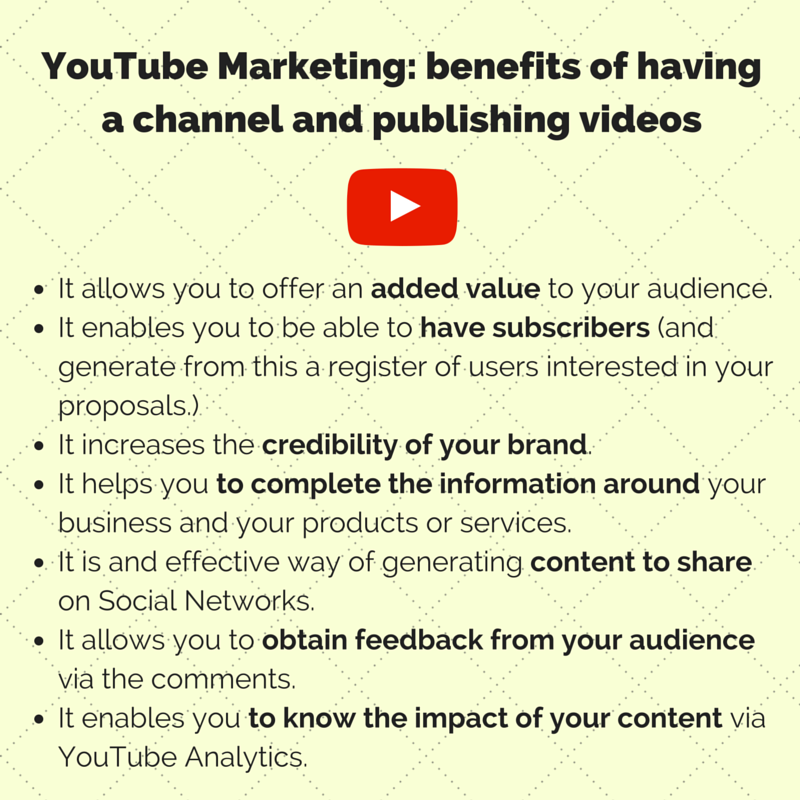
If you’re wondering what types of content to put on your channel, here are a few ideas to get you started:
- Common mistakes people make in a specific programming language
- A showcase of your programming skills to inspire others and impress prospective clients or employers
- A compilation of the best online programming tutorials for beginners
- What people should know before becoming a web developer
- The best online freelancing platforms for coders to make money online
12. Work as a Coding Coach for Businesses
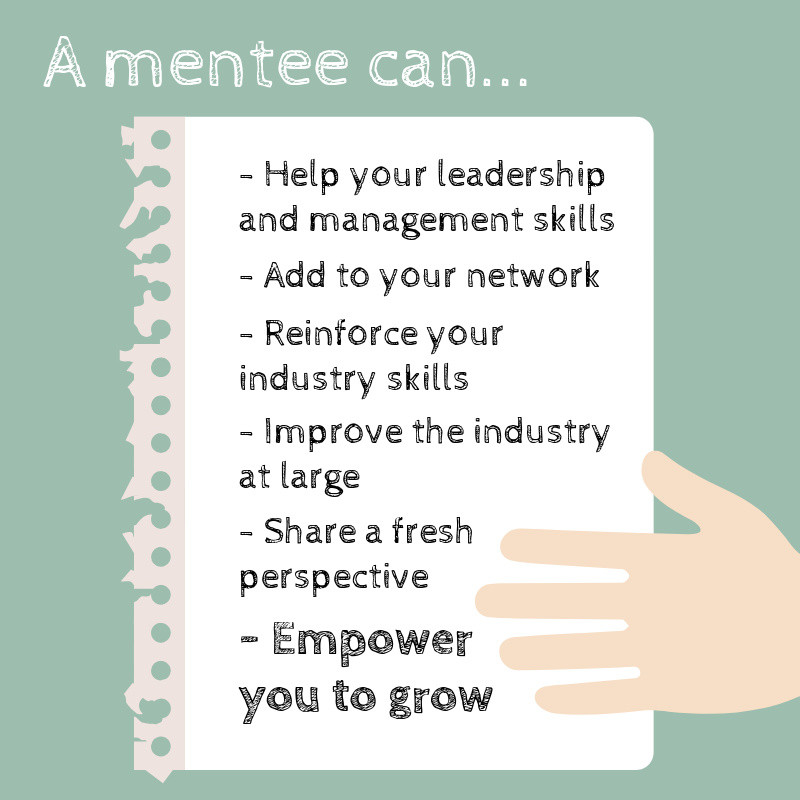
If you have a lot of coding experience, you can use your knowledge to help out inexperienced coders through coding coaching. Some businesses hire coding coaches directly, which are usually to help kids and adolescents when they’re learning to code.
Other businesses may need a coding coach without knowing it. In these cases, you can advertise your services so interested companies can contact you. These do not necessarily need to be paid advertisements. For example, you could set up a service page on LinkedIn so that people know to contact you if they’re interested in your services. You could also list your services on Fiverr to make it easy for potential clients to find you.
13. Create Webshops for Clients
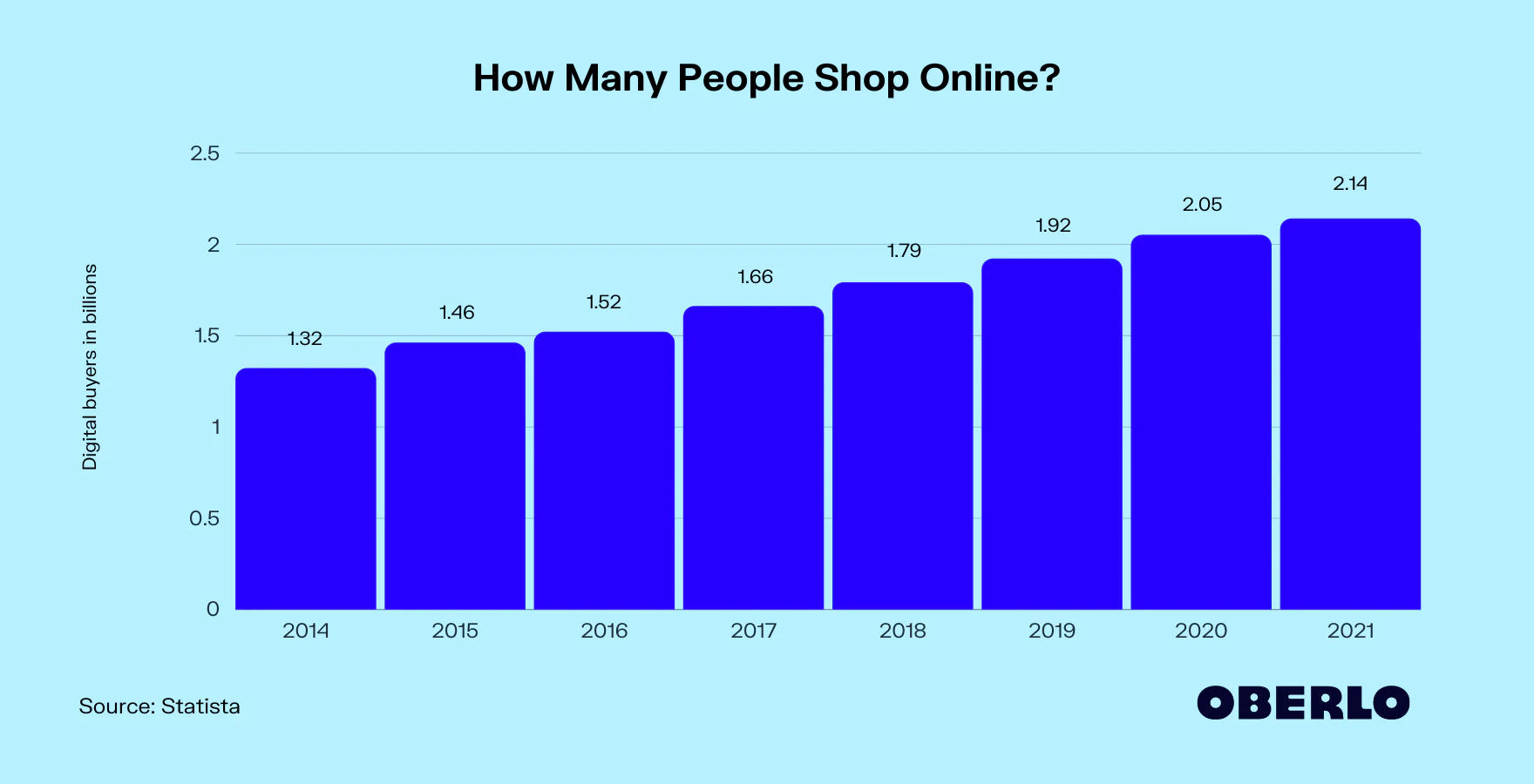
Considering that there were 2.14 billion online shoppers worldwide in 2021, there are many businesses looking to take advantage of this sizeable market. To do that, they’ll need a webshop. But they can’t just set up any webshop. It needs to be one with customers in mind from the outset. A confusing, disorganized, poorly designed webshop will encourage people to click off the site rather than clicking “Check out.” As a coder, you’re in a good position to handle the technical side of a business’s eCommerce store. All you need to do is find businesses that are looking for a webshop. You can post about your services on social media to get some traction or list them on a marketplace like Fiverr.
14. Code and Sell Your Own Projects
If you don’t want to sell an app, you can sell a coding project instead. One way to do this is by selling your private GitHub repository. This will require an external service such as basetools. It will allow you to create a landing page for your GitHub repository and grant access to those who buy it.
15. Find Work on Fiverr/Upwork
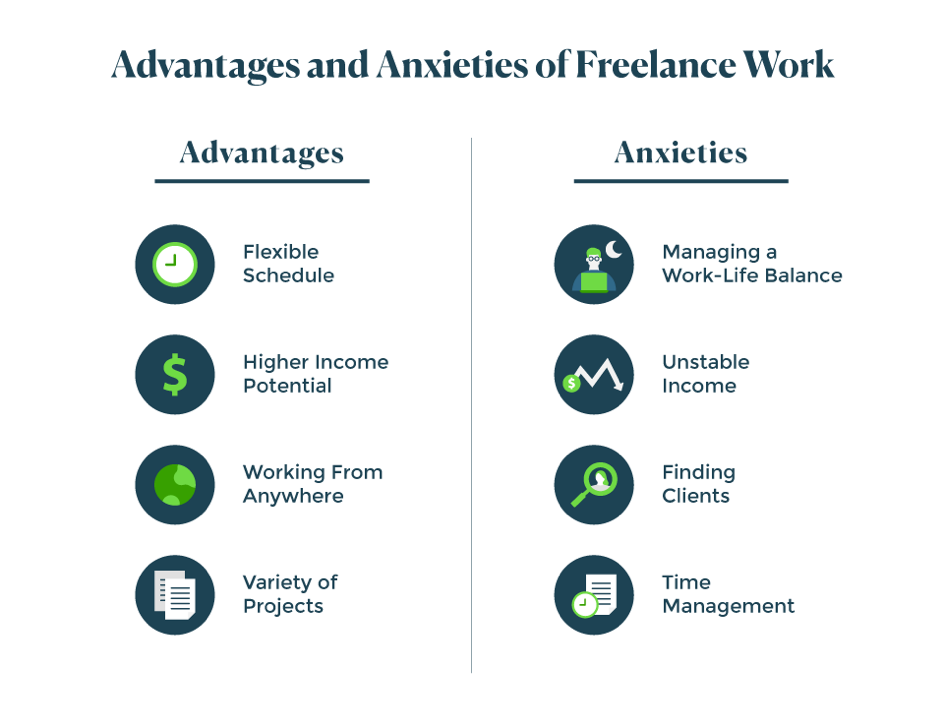
I’ve mentioned Fiverr a few times in this article for listing your services, but Fiverr also works in reverse, too — clients can post what they need for service providers to fulfill. This is in the Buyer Requests section, which becomes visible once you become a seller on the platform. It can take a while for you to get your first sale on Fiverr, but if you can fulfill a buyer request, you may be able to get the ball rolling sooner.
Upwork is a platform for freelancers specifically designed around buyer requests. On there, clients post what they’re looking for, and you can apply for the job in hopes of getting chosen. Jobs on Upwork cost Connects.
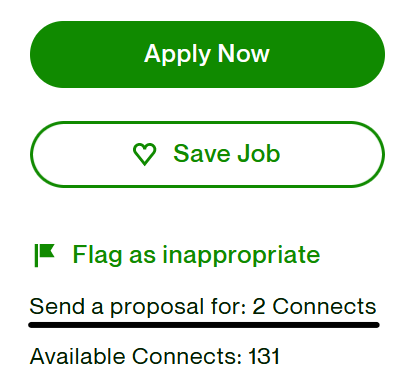
Connects are an internal currency on Upwork. You’ll earn 10 free Connects every month you have an account on Upwork, and earn 80 Connects per month if you upgrade to a Freelancer Plus account (which is a monthly subscription). Connects can also be used to boost your proposal if you want to, which makes your profile more visible to prospective clients if you manage to bid the most Connects.
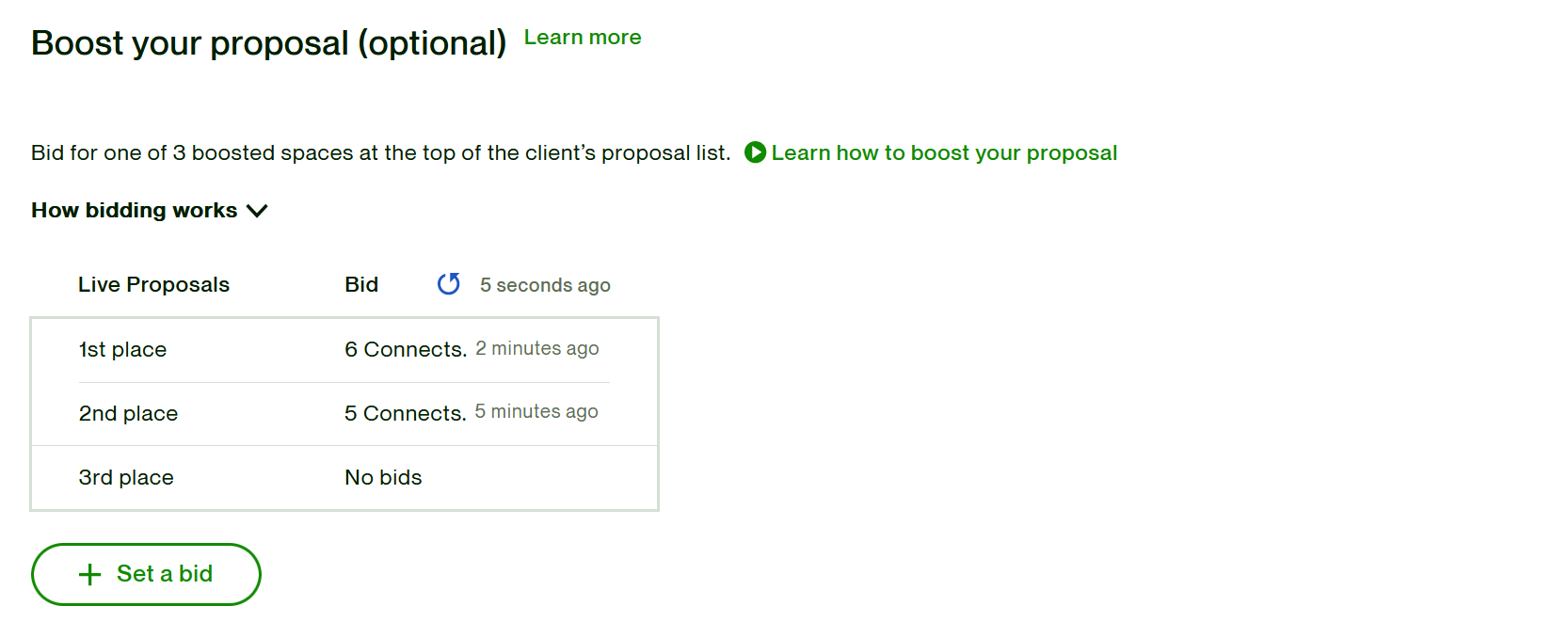
5 Tips for Making More Money With Code
Charge Higher Rates
This might seem obvious, but there are many coders out there who undercharge for the services and products they’re offering. Make sure to consider the amount of work involved and charge yourself a fair rate accordingly. You might choose to get paid by the hour, in which case you can look up average rates people charge for your specific job. For example, here are the average rates for app developers around the world:
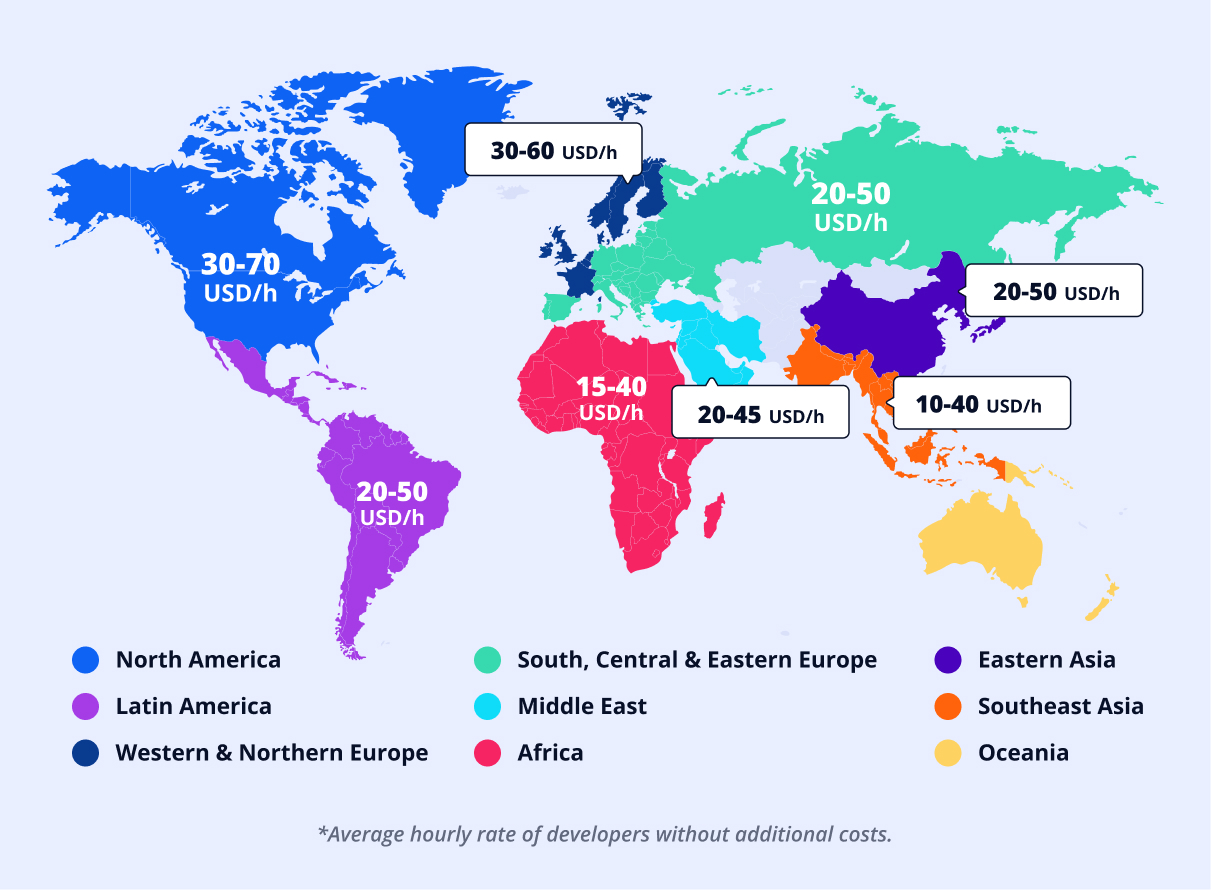
It would be unfair to get paid only $15 an hour as an app developer in the US considering that the minimum rate is double that.
If you’re worried about being competitive, don’t be. Clients that pay fairly also tend to treat you more fairly since they understand you have valuable skills.
Stay on Top of Your Workflow
While it might seem like you should accept as many coding jobs as possible to maximize your revenue, this strategy is counterintuitive. The more coding jobs you have your attention divided between, the less effort you can put into each one. Also, this can lead to stress and burnout, which can kill your efficiency even more. It is important to only take on as many jobs as you can handle given your lifestyle and other obligations.
You should also optimize your time, which will allow you to take on more jobs in the time you have. Set up a weekly schedule and set aside specific times to focus on work. Make sure you’re not using your time to multitask, since multitasking will make you less productive and more easily distractible.
Finally, you should organize your workflow. If you haven’t made much money programming up to this point, it may take some time to find what works for you. Consider trying some productivity apps like the ones below:
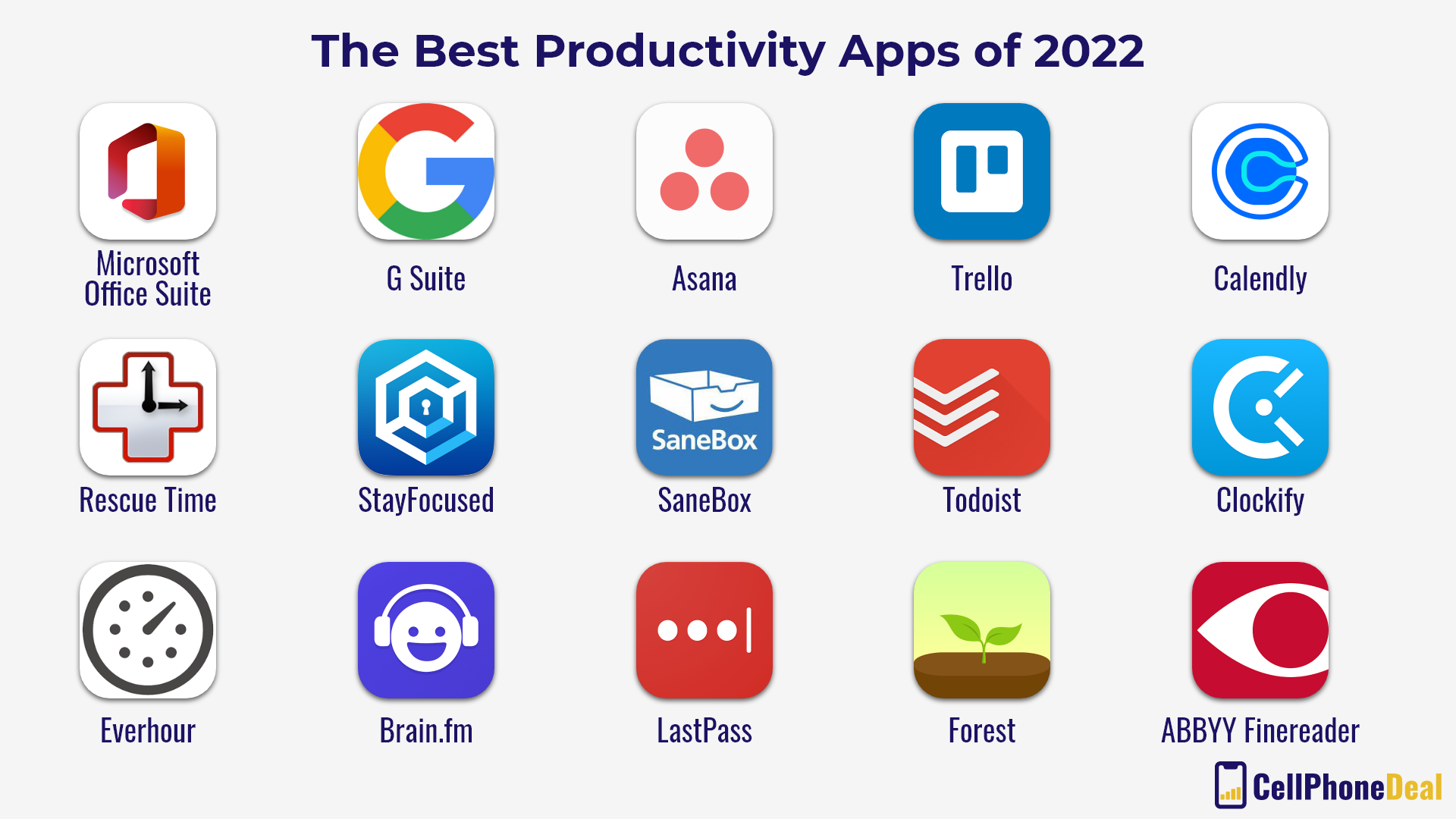
Use a Separate Email Address for Coding Work
This isn’t a direct way of making money, but there are a number of benefits to using a separate email for work:
- Get a better work-life balance: If you use the same email for your personal affairs as your coding business, it can be difficult to tell where work ends and life begins. Separating your email, on the other hand, allows you to completely shut off work for the day to rest and recharge. It’s a great way to reduce stress, thus increasing your overall productivity.
- Better organization: Imagine you receive an important email from a client, but to get to it, you have to sort through your most recent personal emails: coupons, news, messages from your friends, notifications from your social media platforms, and more. It’s definitely a recipe for frustration! When you separate your email out, you won’t have to go digging through your cluttered inbox to find what you need.
- Less distractions: Speaking of cluttered inboxes, all that personal clutter can get pretty distracting. You might see a sale going on and think to yourself, “Oh, I’ll check it out!” Then hours pass by and you haven’t finished anything you set out to do that day. When you have an inbox for only work emails, you can stay focused on what you need to and leave the rest behind for the moment.
Request Testimonials and Referrals (Politely)
Once you start working with clients, you can request testimonials from them. It’s best to do this with clients who have already praised you for your work since they’ll be more likely to give you a testimonal. All you need to do is send them a message or email asking if they’d mind giving you a testimonial that you can post on your website. It’s best to give them a specific question for them to answer in the testimonial and specify the length. For example, you could ask, “Can you describe your experience working with me in a couple of paragraphs?”
Referrals are similar, but instead of asking for a written statement, you’re simply asking your satisfied customers to refer to you to their network.
Don’t Forget About Taxes!
You might wonder why I’m talking about taxes here — after all, taxes are about paying money, not making it… right? Well, there are two main reasons you’ll need to consider taxes. One is that unpaid taxes can add up and lead to fines and other consequences. If you’re working as a traditional employee, you won’t need to worry about anything besides income tax since other taxes are already taken out of your paycheck. But if you’re self-employed, you’ll need to pay quarterly self-employment taxes as well as income taxes if you’re in the US.
Two is that you may be able to get tax credits or deductions depending on your work situation. For example, you may be able to get a home office deduction if you have a space in your house devoted to your coding work.
What is Coding?
Coding involves using programming languages to write instructions that computers can understand. The code can be used to create all kinds of things, from apps to video games and more.
Is Coding Protifable?
Coding can be very profitable, especially if you’ve got some experience in the field. The most sought-after programmers can earn upwards of $10,000 each month, and that’s not including taxes. The amount of money you can earn primarily depends on skill and experience, but also originality; if you make something that people won’t enjoy, you won’t be able to earn money coding, at least in the beginning.
What are the Differences Between Coding, Web Development, and Programming?
Programming, coding, and web development can get pretty confusing considering that some people use the terms interchangeably. To understand the difference, I’ll start by saying that web development and programming always require coding, but not all coding is web development or programming. Web development is the work involved in creating websites, while programming is the work involved in creating a program. This doesn’t include designing the program or website, though, as these are considered separate.
I hope my guide to learning how to make money coding has helped you envision and execute your plans for the future. Good luck!
